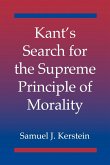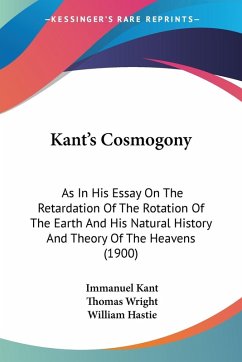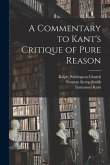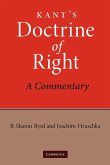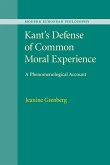Patricia Kitcher
Kant's Thinker
Patricia Kitcher
Kant's Thinker
- Broschiertes Buch
- Merkliste
- Auf die Merkliste
- Bewerten Bewerten
- Teilen
- Produkt teilen
- Produkterinnerung
- Produkterinnerung
This book examines the Critique of Pure Reason's account of the relation between cognition and self-consciousness. It shows how the theory that cognizers must understand their mental states as standing in relations of rational connection has implications for theories of the self-ascription of belief, consciousness and knowledge of other subjects.
Andere Kunden interessierten sich auch für
![Kant's Doctrine of Freedom Kant's Doctrine of Freedom]() Edmund Morris MillerKant's Doctrine of Freedom22,99 €
Edmund Morris MillerKant's Doctrine of Freedom22,99 €![Immanuel Kant's Schriften Zur Naturwissenschaft (1839) Immanuel Kant's Schriften Zur Naturwissenschaft (1839)]() Immanuel KantImmanuel Kant's Schriften Zur Naturwissenschaft (1839)40,99 €
Immanuel KantImmanuel Kant's Schriften Zur Naturwissenschaft (1839)40,99 €![Kant's Search for the Supreme Principle of Morality Kant's Search for the Supreme Principle of Morality]() Samuel J. KersteinKant's Search for the Supreme Principle of Morality35,99 €
Samuel J. KersteinKant's Search for the Supreme Principle of Morality35,99 €![Kant's Cosmogony Kant's Cosmogony]() Immanuel KantKant's Cosmogony31,99 €
Immanuel KantKant's Cosmogony31,99 €![A Commentary to Kant's Critique of Pure Reason A Commentary to Kant's Critique of Pure Reason]() Immanuel KantA Commentary to Kant's Critique of Pure Reason33,99 €
Immanuel KantA Commentary to Kant's Critique of Pure Reason33,99 €![Kant's Doctrine of Right Kant's Doctrine of Right]() B. Sharon ByrdKant's Doctrine of Right60,99 €
B. Sharon ByrdKant's Doctrine of Right60,99 €![Kant's Defense of Common Moral Experience Kant's Defense of Common Moral Experience]() Jeanine GrenbergKant's Defense of Common Moral Experience39,99 €
Jeanine GrenbergKant's Defense of Common Moral Experience39,99 €-
-
-
This book examines the Critique of Pure Reason's account of the relation between cognition and self-consciousness. It shows how the theory that cognizers must understand their mental states as standing in relations of rational connection has implications for theories of the self-ascription of belief, consciousness and knowledge of other subjects.
Produktdetails
- Produktdetails
- Verlag: Oxford University Press
- Seitenzahl: 328
- Erscheinungstermin: 1. Februar 2014
- Englisch
- Abmessung: 234mm x 156mm x 19mm
- Gewicht: 560g
- ISBN-13: 9780199363728
- ISBN-10: 0199363722
- Artikelnr.: 39740710
- Herstellerkennzeichnung
- Libri GmbH
- Europaallee 1
- 36244 Bad Hersfeld
- gpsr@libri.de
- Verlag: Oxford University Press
- Seitenzahl: 328
- Erscheinungstermin: 1. Februar 2014
- Englisch
- Abmessung: 234mm x 156mm x 19mm
- Gewicht: 560g
- ISBN-13: 9780199363728
- ISBN-10: 0199363722
- Artikelnr.: 39740710
- Herstellerkennzeichnung
- Libri GmbH
- Europaallee 1
- 36244 Bad Hersfeld
- gpsr@libri.de
Patricia Kitcher is Professor of Philosophy at Columbia University. She is the author of Kant's Transcendental Psychology.
* 1. Overview
* 1. Introduction
* 2. Interpretive Framework
* 3. Preview
* 4. Current Work on Kant's 'I-Think'
* Part I: Background
* 2. Locke's Internal Sense and Kant's Changing Views
* 1. Locke's Influence
* 2. Locke's Complex Theory of Internal Sense
* 3. Kant's Varied Reactions
* 4. 'Inner Sense' in relation to Kantian 'Apperception'
* 5. Kant's Use of 'Inner Sense'
* 3. Personal Identity and Its Problems
* 1. Locke's Problem
* 2. Leibniz's Criticisms and Additions
* 3. Kant and Hume
* 4. Tetens (and Hume)
* 4. Rationalist Metaphysics of Mind
* 1. The Role of Rationalism
* 2. Leibniz's Elegant 'I-theory'
* 3. Faculties, Powers and Substances
* 4. Rational Psychology
* 5. Consciousness, Self-Consciousness and Cognition
* 1. Introduction
* 2. Locke's 'Reflection' and Leibniz's 'Apperception'
* 3. Self-consciousness and Object cognition
* 4. Self-Consciousness through Self-Feeling
* 5. Summary
* 6. Strands of Argument in the Duisburg Nachla?
* 1. Introduction
* 2. Kant's Objection to the Inaugural Dissertation
* 3. Principles of Appearance and Thought in the Duisburg NachlaB
Notion of Apperception?
* 4. What is the Duisburg Nachla?'s Notion of 'Apperception?
* 5. From the Duisburg NachlaB to the Critique
* Part II: Theory
* 7. A Transcendental Deduction for A Priori Concepts
* 1. Kant's Goal
* 2. Clues to the Nature of the Argument
* 3. The First Premise of the Transcendental Deduction
* 4. Apriority and Activity
* 5. A 'Transcendental' Deduction
* 8. Synthesis: Why and How?
* 1. Problems to be Solved
* 2. Kant's Definition
* 3. Synthesis and Objective Reference
* 4. Five Syntheses and Their Relations
* 9. Arguing for Apperception
* 1. Introduction
* 2. 'I-Think' as the 'Cogito'; The One-step Deduction from Judgment
* 3. What Kind of Cognition Is at Issue in the Transcendental
Deduction?
* 4. What is the Principle of Apperception?
* 5. The Apperceptive Synthesis of Recognition in a Concept
* 6.Combination and Self-Consciousness in the B Deduction
* 7. Arguing from the Unity of Apperception to the Necessary
Applicability of Categories to Intuitions
* 8. Transcendental Apperception, Empirical Apperception and 'Mineness'
* 9. Summary
* 10. The Power of Apperception
* 1. Introduction
* 2. What is the Power/Faculty of Apperception?
* 3. Does the Faculty of Apperception Endure? Is it the 'Inner
Principle' of a Substance?
* 4. Does the Power of Apperception Initiate Causal Chains or Provide
Impressions of Necessary Connection?
* 5. 'Is it an Experience That I think?'
* 6. Root Powers, Scientific Ideals and the Ground of Appearances
* 11. 'I-Think' as the Destroyer of Rational Psychology
* 1. Understanding Kant's Criticisms
* 2. Kant's Earlier and Later Treatments of Rational Psychology
* 3. 'I-Think' as the Vehicle of the Categories
* 4. 'I-Think' as Analytically Contained in the Concept of Thought
* 5. Does the Analysis of Cognition Imply the Existence of a Thinker?
* 6. Why Can't Thinkers Know Themselves as Such?
* Part III: Evaluation
* 12. Is Kant's Theory Consistent?
* 1. The Old Objection
* 2. The Most Problematic Passage (A251-52)
* 3. The Confusion about the Causes of Sensations
* 4. A Second Look at the Most Problematic Passage
* 5. Criticizing Rationalist Confusions
* 6. What Kant's Epistemology and Metaphysics Imply
* 13. The Normativity Objection
* 1. Psychologism or Noumenalism?
* 2. Scrutinizing Sensations and Adding 'Transcendental Content'
* 3. Forming Concepts and Acquiring the I-Representation
* 4. Making A Priori Principles Explicit and Testing Instances
* 5. Normativity and the I-rule
* Appendix to Chapter 13: Longuenesse on Concept Formation
* 14. Is Kant's Thinker (as Such) a Free and Responsible Agent?
* 1. Introduction
* 2. Texts Linking Theoretical and Practical Reason
* 3. Autonomy and Accountability
* 4. Intellectual Accountability
* 15. Kant our Contemporary
* 1. Supporting and Showing Relevance
* 2. Transcendental Arguments
* 3. Must Rational Cognition involve Self-consciousness?
* 4. A Second Hard Problem of Consciousness?
* 5. Other 'I's
* 1. Introduction
* 2. Interpretive Framework
* 3. Preview
* 4. Current Work on Kant's 'I-Think'
* Part I: Background
* 2. Locke's Internal Sense and Kant's Changing Views
* 1. Locke's Influence
* 2. Locke's Complex Theory of Internal Sense
* 3. Kant's Varied Reactions
* 4. 'Inner Sense' in relation to Kantian 'Apperception'
* 5. Kant's Use of 'Inner Sense'
* 3. Personal Identity and Its Problems
* 1. Locke's Problem
* 2. Leibniz's Criticisms and Additions
* 3. Kant and Hume
* 4. Tetens (and Hume)
* 4. Rationalist Metaphysics of Mind
* 1. The Role of Rationalism
* 2. Leibniz's Elegant 'I-theory'
* 3. Faculties, Powers and Substances
* 4. Rational Psychology
* 5. Consciousness, Self-Consciousness and Cognition
* 1. Introduction
* 2. Locke's 'Reflection' and Leibniz's 'Apperception'
* 3. Self-consciousness and Object cognition
* 4. Self-Consciousness through Self-Feeling
* 5. Summary
* 6. Strands of Argument in the Duisburg Nachla?
* 1. Introduction
* 2. Kant's Objection to the Inaugural Dissertation
* 3. Principles of Appearance and Thought in the Duisburg NachlaB
Notion of Apperception?
* 4. What is the Duisburg Nachla?'s Notion of 'Apperception?
* 5. From the Duisburg NachlaB to the Critique
* Part II: Theory
* 7. A Transcendental Deduction for A Priori Concepts
* 1. Kant's Goal
* 2. Clues to the Nature of the Argument
* 3. The First Premise of the Transcendental Deduction
* 4. Apriority and Activity
* 5. A 'Transcendental' Deduction
* 8. Synthesis: Why and How?
* 1. Problems to be Solved
* 2. Kant's Definition
* 3. Synthesis and Objective Reference
* 4. Five Syntheses and Their Relations
* 9. Arguing for Apperception
* 1. Introduction
* 2. 'I-Think' as the 'Cogito'; The One-step Deduction from Judgment
* 3. What Kind of Cognition Is at Issue in the Transcendental
Deduction?
* 4. What is the Principle of Apperception?
* 5. The Apperceptive Synthesis of Recognition in a Concept
* 6.Combination and Self-Consciousness in the B Deduction
* 7. Arguing from the Unity of Apperception to the Necessary
Applicability of Categories to Intuitions
* 8. Transcendental Apperception, Empirical Apperception and 'Mineness'
* 9. Summary
* 10. The Power of Apperception
* 1. Introduction
* 2. What is the Power/Faculty of Apperception?
* 3. Does the Faculty of Apperception Endure? Is it the 'Inner
Principle' of a Substance?
* 4. Does the Power of Apperception Initiate Causal Chains or Provide
Impressions of Necessary Connection?
* 5. 'Is it an Experience That I think?'
* 6. Root Powers, Scientific Ideals and the Ground of Appearances
* 11. 'I-Think' as the Destroyer of Rational Psychology
* 1. Understanding Kant's Criticisms
* 2. Kant's Earlier and Later Treatments of Rational Psychology
* 3. 'I-Think' as the Vehicle of the Categories
* 4. 'I-Think' as Analytically Contained in the Concept of Thought
* 5. Does the Analysis of Cognition Imply the Existence of a Thinker?
* 6. Why Can't Thinkers Know Themselves as Such?
* Part III: Evaluation
* 12. Is Kant's Theory Consistent?
* 1. The Old Objection
* 2. The Most Problematic Passage (A251-52)
* 3. The Confusion about the Causes of Sensations
* 4. A Second Look at the Most Problematic Passage
* 5. Criticizing Rationalist Confusions
* 6. What Kant's Epistemology and Metaphysics Imply
* 13. The Normativity Objection
* 1. Psychologism or Noumenalism?
* 2. Scrutinizing Sensations and Adding 'Transcendental Content'
* 3. Forming Concepts and Acquiring the I-Representation
* 4. Making A Priori Principles Explicit and Testing Instances
* 5. Normativity and the I-rule
* Appendix to Chapter 13: Longuenesse on Concept Formation
* 14. Is Kant's Thinker (as Such) a Free and Responsible Agent?
* 1. Introduction
* 2. Texts Linking Theoretical and Practical Reason
* 3. Autonomy and Accountability
* 4. Intellectual Accountability
* 15. Kant our Contemporary
* 1. Supporting and Showing Relevance
* 2. Transcendental Arguments
* 3. Must Rational Cognition involve Self-consciousness?
* 4. A Second Hard Problem of Consciousness?
* 5. Other 'I's
* 1. Overview
* 1. Introduction
* 2. Interpretive Framework
* 3. Preview
* 4. Current Work on Kant's 'I-Think'
* Part I: Background
* 2. Locke's Internal Sense and Kant's Changing Views
* 1. Locke's Influence
* 2. Locke's Complex Theory of Internal Sense
* 3. Kant's Varied Reactions
* 4. 'Inner Sense' in relation to Kantian 'Apperception'
* 5. Kant's Use of 'Inner Sense'
* 3. Personal Identity and Its Problems
* 1. Locke's Problem
* 2. Leibniz's Criticisms and Additions
* 3. Kant and Hume
* 4. Tetens (and Hume)
* 4. Rationalist Metaphysics of Mind
* 1. The Role of Rationalism
* 2. Leibniz's Elegant 'I-theory'
* 3. Faculties, Powers and Substances
* 4. Rational Psychology
* 5. Consciousness, Self-Consciousness and Cognition
* 1. Introduction
* 2. Locke's 'Reflection' and Leibniz's 'Apperception'
* 3. Self-consciousness and Object cognition
* 4. Self-Consciousness through Self-Feeling
* 5. Summary
* 6. Strands of Argument in the Duisburg Nachla?
* 1. Introduction
* 2. Kant's Objection to the Inaugural Dissertation
* 3. Principles of Appearance and Thought in the Duisburg NachlaB
Notion of Apperception?
* 4. What is the Duisburg Nachla?'s Notion of 'Apperception?
* 5. From the Duisburg NachlaB to the Critique
* Part II: Theory
* 7. A Transcendental Deduction for A Priori Concepts
* 1. Kant's Goal
* 2. Clues to the Nature of the Argument
* 3. The First Premise of the Transcendental Deduction
* 4. Apriority and Activity
* 5. A 'Transcendental' Deduction
* 8. Synthesis: Why and How?
* 1. Problems to be Solved
* 2. Kant's Definition
* 3. Synthesis and Objective Reference
* 4. Five Syntheses and Their Relations
* 9. Arguing for Apperception
* 1. Introduction
* 2. 'I-Think' as the 'Cogito'; The One-step Deduction from Judgment
* 3. What Kind of Cognition Is at Issue in the Transcendental
Deduction?
* 4. What is the Principle of Apperception?
* 5. The Apperceptive Synthesis of Recognition in a Concept
* 6.Combination and Self-Consciousness in the B Deduction
* 7. Arguing from the Unity of Apperception to the Necessary
Applicability of Categories to Intuitions
* 8. Transcendental Apperception, Empirical Apperception and 'Mineness'
* 9. Summary
* 10. The Power of Apperception
* 1. Introduction
* 2. What is the Power/Faculty of Apperception?
* 3. Does the Faculty of Apperception Endure? Is it the 'Inner
Principle' of a Substance?
* 4. Does the Power of Apperception Initiate Causal Chains or Provide
Impressions of Necessary Connection?
* 5. 'Is it an Experience That I think?'
* 6. Root Powers, Scientific Ideals and the Ground of Appearances
* 11. 'I-Think' as the Destroyer of Rational Psychology
* 1. Understanding Kant's Criticisms
* 2. Kant's Earlier and Later Treatments of Rational Psychology
* 3. 'I-Think' as the Vehicle of the Categories
* 4. 'I-Think' as Analytically Contained in the Concept of Thought
* 5. Does the Analysis of Cognition Imply the Existence of a Thinker?
* 6. Why Can't Thinkers Know Themselves as Such?
* Part III: Evaluation
* 12. Is Kant's Theory Consistent?
* 1. The Old Objection
* 2. The Most Problematic Passage (A251-52)
* 3. The Confusion about the Causes of Sensations
* 4. A Second Look at the Most Problematic Passage
* 5. Criticizing Rationalist Confusions
* 6. What Kant's Epistemology and Metaphysics Imply
* 13. The Normativity Objection
* 1. Psychologism or Noumenalism?
* 2. Scrutinizing Sensations and Adding 'Transcendental Content'
* 3. Forming Concepts and Acquiring the I-Representation
* 4. Making A Priori Principles Explicit and Testing Instances
* 5. Normativity and the I-rule
* Appendix to Chapter 13: Longuenesse on Concept Formation
* 14. Is Kant's Thinker (as Such) a Free and Responsible Agent?
* 1. Introduction
* 2. Texts Linking Theoretical and Practical Reason
* 3. Autonomy and Accountability
* 4. Intellectual Accountability
* 15. Kant our Contemporary
* 1. Supporting and Showing Relevance
* 2. Transcendental Arguments
* 3. Must Rational Cognition involve Self-consciousness?
* 4. A Second Hard Problem of Consciousness?
* 5. Other 'I's
* 1. Introduction
* 2. Interpretive Framework
* 3. Preview
* 4. Current Work on Kant's 'I-Think'
* Part I: Background
* 2. Locke's Internal Sense and Kant's Changing Views
* 1. Locke's Influence
* 2. Locke's Complex Theory of Internal Sense
* 3. Kant's Varied Reactions
* 4. 'Inner Sense' in relation to Kantian 'Apperception'
* 5. Kant's Use of 'Inner Sense'
* 3. Personal Identity and Its Problems
* 1. Locke's Problem
* 2. Leibniz's Criticisms and Additions
* 3. Kant and Hume
* 4. Tetens (and Hume)
* 4. Rationalist Metaphysics of Mind
* 1. The Role of Rationalism
* 2. Leibniz's Elegant 'I-theory'
* 3. Faculties, Powers and Substances
* 4. Rational Psychology
* 5. Consciousness, Self-Consciousness and Cognition
* 1. Introduction
* 2. Locke's 'Reflection' and Leibniz's 'Apperception'
* 3. Self-consciousness and Object cognition
* 4. Self-Consciousness through Self-Feeling
* 5. Summary
* 6. Strands of Argument in the Duisburg Nachla?
* 1. Introduction
* 2. Kant's Objection to the Inaugural Dissertation
* 3. Principles of Appearance and Thought in the Duisburg NachlaB
Notion of Apperception?
* 4. What is the Duisburg Nachla?'s Notion of 'Apperception?
* 5. From the Duisburg NachlaB to the Critique
* Part II: Theory
* 7. A Transcendental Deduction for A Priori Concepts
* 1. Kant's Goal
* 2. Clues to the Nature of the Argument
* 3. The First Premise of the Transcendental Deduction
* 4. Apriority and Activity
* 5. A 'Transcendental' Deduction
* 8. Synthesis: Why and How?
* 1. Problems to be Solved
* 2. Kant's Definition
* 3. Synthesis and Objective Reference
* 4. Five Syntheses and Their Relations
* 9. Arguing for Apperception
* 1. Introduction
* 2. 'I-Think' as the 'Cogito'; The One-step Deduction from Judgment
* 3. What Kind of Cognition Is at Issue in the Transcendental
Deduction?
* 4. What is the Principle of Apperception?
* 5. The Apperceptive Synthesis of Recognition in a Concept
* 6.Combination and Self-Consciousness in the B Deduction
* 7. Arguing from the Unity of Apperception to the Necessary
Applicability of Categories to Intuitions
* 8. Transcendental Apperception, Empirical Apperception and 'Mineness'
* 9. Summary
* 10. The Power of Apperception
* 1. Introduction
* 2. What is the Power/Faculty of Apperception?
* 3. Does the Faculty of Apperception Endure? Is it the 'Inner
Principle' of a Substance?
* 4. Does the Power of Apperception Initiate Causal Chains or Provide
Impressions of Necessary Connection?
* 5. 'Is it an Experience That I think?'
* 6. Root Powers, Scientific Ideals and the Ground of Appearances
* 11. 'I-Think' as the Destroyer of Rational Psychology
* 1. Understanding Kant's Criticisms
* 2. Kant's Earlier and Later Treatments of Rational Psychology
* 3. 'I-Think' as the Vehicle of the Categories
* 4. 'I-Think' as Analytically Contained in the Concept of Thought
* 5. Does the Analysis of Cognition Imply the Existence of a Thinker?
* 6. Why Can't Thinkers Know Themselves as Such?
* Part III: Evaluation
* 12. Is Kant's Theory Consistent?
* 1. The Old Objection
* 2. The Most Problematic Passage (A251-52)
* 3. The Confusion about the Causes of Sensations
* 4. A Second Look at the Most Problematic Passage
* 5. Criticizing Rationalist Confusions
* 6. What Kant's Epistemology and Metaphysics Imply
* 13. The Normativity Objection
* 1. Psychologism or Noumenalism?
* 2. Scrutinizing Sensations and Adding 'Transcendental Content'
* 3. Forming Concepts and Acquiring the I-Representation
* 4. Making A Priori Principles Explicit and Testing Instances
* 5. Normativity and the I-rule
* Appendix to Chapter 13: Longuenesse on Concept Formation
* 14. Is Kant's Thinker (as Such) a Free and Responsible Agent?
* 1. Introduction
* 2. Texts Linking Theoretical and Practical Reason
* 3. Autonomy and Accountability
* 4. Intellectual Accountability
* 15. Kant our Contemporary
* 1. Supporting and Showing Relevance
* 2. Transcendental Arguments
* 3. Must Rational Cognition involve Self-consciousness?
* 4. A Second Hard Problem of Consciousness?
* 5. Other 'I's





